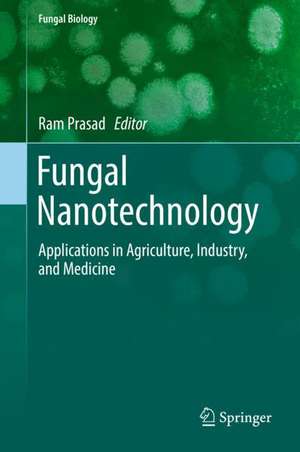Fungal Nanotechnology: Applications in Agriculture, Industry, and Medicine: Fungal Biology
Editat de Ram Prasaden Limba Engleză Hardback – 8 dec 2017
| Toate formatele și edițiile | Preț | Express |
|---|---|---|
| Paperback (1) | 784.79 lei 38-44 zile | |
| Springer International Publishing – 9 sep 2018 | 784.79 lei 38-44 zile | |
| Hardback (1) | 951.14 lei 43-57 zile | |
| Springer International Publishing – 8 dec 2017 | 951.14 lei 43-57 zile |
Din seria Fungal Biology
- 18%
 Preț: 1122.72 lei
Preț: 1122.72 lei - 15%
 Preț: 658.22 lei
Preț: 658.22 lei - 18%
 Preț: 1110.72 lei
Preț: 1110.72 lei - 20%
 Preț: 544.50 lei
Preț: 544.50 lei - 18%
 Preț: 948.61 lei
Preț: 948.61 lei - 18%
 Preț: 960.42 lei
Preț: 960.42 lei - 24%
 Preț: 1074.50 lei
Preț: 1074.50 lei - 18%
 Preț: 1228.96 lei
Preț: 1228.96 lei - 15%
 Preț: 635.01 lei
Preț: 635.01 lei - 18%
 Preț: 1403.98 lei
Preț: 1403.98 lei - 18%
 Preț: 1117.99 lei
Preț: 1117.99 lei - 15%
 Preț: 657.57 lei
Preț: 657.57 lei - 18%
 Preț: 958.88 lei
Preț: 958.88 lei - 18%
 Preț: 951.77 lei
Preț: 951.77 lei - 18%
 Preț: 957.75 lei
Preț: 957.75 lei - 18%
 Preț: 1112.15 lei
Preț: 1112.15 lei - 18%
 Preț: 998.34 lei
Preț: 998.34 lei - 18%
 Preț: 954.93 lei
Preț: 954.93 lei - 18%
 Preț: 1117.99 lei
Preț: 1117.99 lei - 18%
 Preț: 1120.18 lei
Preț: 1120.18 lei - 15%
 Preț: 643.34 lei
Preț: 643.34 lei - 15%
 Preț: 640.71 lei
Preț: 640.71 lei - 18%
 Preț: 948.92 lei
Preț: 948.92 lei - 15%
 Preț: 644.95 lei
Preț: 644.95 lei - 18%
 Preț: 1844.67 lei
Preț: 1844.67 lei - 18%
 Preț: 947.67 lei
Preț: 947.67 lei - 18%
 Preț: 1111.67 lei
Preț: 1111.67 lei - 18%
 Preț: 1010.65 lei
Preț: 1010.65 lei - 18%
 Preț: 953.35 lei
Preț: 953.35 lei - 18%
 Preț: 959.19 lei
Preț: 959.19 lei - 15%
 Preț: 645.28 lei
Preț: 645.28 lei
Preț: 951.14 lei
Preț vechi: 1159.94 lei
-18% Nou
Puncte Express: 1427
Preț estimativ în valută:
182.06€ • 197.82$ • 153.03£
182.06€ • 197.82$ • 153.03£
Carte tipărită la comandă
Livrare economică 21 aprilie-05 mai
Preluare comenzi: 021 569.72.76
Specificații
ISBN-13: 9783319684239
ISBN-10: 331968423X
Pagini: 321
Ilustrații: XI, 295 p. 47 illus., 41 illus. in color.
Dimensiuni: 155 x 235 mm
Greutate: 0.61 kg
Ediția:1st ed. 2017
Editura: Springer International Publishing
Colecția Springer
Seria Fungal Biology
Locul publicării:Cham, Switzerland
ISBN-10: 331968423X
Pagini: 321
Ilustrații: XI, 295 p. 47 illus., 41 illus. in color.
Dimensiuni: 155 x 235 mm
Greutate: 0.61 kg
Ediția:1st ed. 2017
Editura: Springer International Publishing
Colecția Springer
Seria Fungal Biology
Locul publicării:Cham, Switzerland
Cuprins
Fungal Nanotechnology: A Pandora to Agricultural Science and Engineering.- Agriculture Applications of Entomopathogenic Fungi using Nanotechnology.- Fungi as Ecosynthesizers for Nanoparticles and Their Application in Agriculture.- Myconanotechnology in Agriculture.- Fungus-mediated Bioleaching of Metallic Nanoparticles from Agro Industrial By-products.- Synthesis and Applications of Nano-Fungicides: A Next Generation Fungicide.- Enzymes and Nanoparticles Produced by Microorganisms and Their Applications in Biotechnology.- Biological Nanoparticles: Optical and Photothermal Properties.- Biogenic Synthesis of Silver Nanoparticles and Their Applications.- Fungal Bionanotechnology, when knowledge Merge into a New Discipline to Combat Antimicrobial Resistance.- Fungal Nanotechnology and Biomedicine.- Myconanotechnology to Treat Infectious Diseases: A Perspective.- Nanobiotechnology Applications in Special Reference to Fungi.
Notă biografică
Ram Prasad is Assistant Professor at the Amity Institute of Microbial Technology, Amity University, Uttar Pradesh, India. Dr. Prasad completed his Ph.D. at the Department of Microbiology, Chaudhary Charan Singh University, Meerut, UP, India, in collaboration with the School of Life Sciences, Jawaharlal Nehru University (JNU), New Delhi, India. He received his M.Sc. in Life Sciences at JNU and also qualified CSIR-NET, ASRB-NET, and GATE. His research interests include plant microbe-interactions, sustainable agriculture, and microbial nanobiotechnology. Dr. Prasad has more than hundred publications to his credit, including research papers and book chapters, five patents issued or pending, and has edited or authored several books. Dr. Prasad has eleven years of teaching experience and he has been awarded the Young Scientist Award (2007) and Prof. J.S. Datta Munshi Gold Medal (2009) by the International Society for Ecological Communications; FSAB fellowship (2010) by the Society for Applied Biotechnology; Outstanding Scientist Award (2015) in the field of Microbiology by Venus International Foundation and the American Cancer Society UICC International Fellowship for Beginning Investigators (USA 2014). In 2014-2015, Dr. Prasad served as Visiting Assistant Professor in the Department of Mechanical Engineering at Johns Hopkins University, USA.
Textul de pe ultima copertă
Fungal nanotechnology has great prospects for developing new products with industrial, agricultural, medicinal, and consumer applications in a wide range of sectors. The fields of chemical engineering, agri-food, biochemistry, pharmaceuticals, diagnostics, and medical device development all employ fungal products, with fungal nanomaterials currently used in applications ranging from drug development to the food industry and agricultural biotechnology. Fungal agents are an environmentally friendly, clean, non‐toxic agent for the synthesis of metal nanoparticles and employ both intracellular and extracellular methods. The simplicity of scaling up and downstream processing and the presence of fungal mycelia which afford an increased surface area provide key advantages. In addition, the large spectrum of synthesized nanoparticle morphologies and the substantially faster biosynthesis rate in cell-free filtrate (due to the higher amount of proteins secreted in fungi) make this a particularlyenticing route. Understanding the diversity of fungi in assorted ecosystems, as well as their interactions with other microorganisms, animals, and plants, underpins real and innovative technological developments and the applications of metal nanoparticles in many disciplines including agriculture, catalysis, and biomedical biosensors. Importantly, biogenic fungal nanoparticles show significant synergistic characteristics when combined with antibiotics and fungicides to offer substantially greater resistance to microbial growth and applications in nanomedicine ranging from topical ointments and bandages for wound healing to coated stents.
Caracteristici
Presents the potential of fungal nanotechnology in developing new products Includes its wide-range of applications to biomedicine, agriculture, and the environment Features contributions from scientists across the globe
